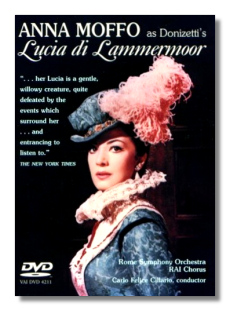
The Internet's Premier Classical Music Source
Related Links
- Donizetti Reviews
- Latest Reviews
- More Reviews
-
By Composer
-
Collections
DVD & Blu-ray
Books
Concert Reviews
Articles/Interviews
Software
Audio
Search Amazon
Recommended Links
Site News
 DVD Review
DVD Review
Gaetano Donizetti

Lucia di Lammermoor
- Anna Moffo (Lucia)
- Lajos Kozma (Edgardo)
- Giulio Fioravanti (Enrico)
- Paolo Washington (Raimondo)
RAI Chorus
Rome Symphony Orchestra/Carlo Felice Cillario
VAI DVD 4211 114m
I don't understand why Anna Moffo hasn't been given the consideration given many of her contemporaries. Perhaps the reason is that she was a gifted singer among many gifted singers – we were spoiled. Perhaps her physical beauty inspired mistrust, i.e., "How could anyone that attractive be an opera singer?" In any event, it is good to have a visual reminder of her Lucia on DVD, even though there are some serious drawbacks to this Lucia as a whole.
Shot in and around some castle or other in 1971, this is a film, not a stage production, which means the singers lip-synch to their pre-recorded voices. This seldom looks convincing, and it doesn't here. The visual aspects of this film are naïve and awkward at best, laughable at worst. The editing is atrocious, and the outdoor scenes are full of pointless upward shots of castle walls and the tops of trees. There's much that just doesn't make sense. On the way to Lucia's wedding to Arturo, we hear the chorus singing about a happy occasion, but the well-dressed people heading toward the castle look extremely unhappy. (Also, they are not singing.) Following the sextet, who are these presumed followers of Edgardo who crash the wedding to engage Enrico's men in what looks like stagey fencing practice (while the principals turn their backs to them and keep on singing)? Halfway through the Mad Scene, why is the deranged Lucia allowed to wander away from the castle? Obviously a liability, she is followed by no one, except (inexplicably) by the voices of the chorus. The thud-and-blunder acting does no one any favors; Lucia's final rag-doll collapse on the lawn is especially funny. The tenor who sings Arturo has a fearsome vibrato, and the Normanno is poor. The peaky monaural sound discolors high notes and loud passages. The film itself has not aged well; it's wavery and grainy.
Nevertheless, there have to be some reasons why this film was deemed worthy of preservation. As indicated above, Moffo is gorgeous, and she acts well when the director isn't making her look ridiculous. Her singing – a few high notes notwithstanding – is assured and distinctive. (Her career was already nearing its end.) Kozma was a pleasant surprise. The only other thing I've heard him sing is Monteverdi's Orfeo for Harnoncourt (!), so his vibrant, even Bjoerling-like Edgardo was not what I expected. He doesn't do much acting, but he looks great riding off on his horse at the end of Act One. Giulio Fioravanti's Enrico isn't bad, and the Raimondo of Paolo Washington (I've always loved that name!) has stature. Cillario's conducting is unabashedly grand, never settling into routine.
There are big fat English subtitles. Shutting them off is not an option.
In spite of much to moan, groan, and guffaw about, this Lucia is worth having for the singing of the principals and for the conducting.
Copyright © 2003, Raymond Tuttle


















